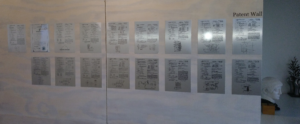I am delighted to learn that a date has been set for the USPTO to pull the plug on PDX for the connection between the USPTO and the Korean Intellectual Property Office.
As I blogged here, the Korean Intellectual Property Office (KIPO) recently became a Depositing Office in DAS for purposes of design applications. This was of course welcome news but it did not help US filers, because:
- until now USPTO and KIPO have had an available connection through PDX, and
- PDX does not support designs, although DAS does, and
- PDX trumps DAS, meaning that between any two Offices, if there is a DAS connection, it will not get used so long as there is a PDX connection.
USPTO has announced that the plug will get pulled on PDX on December 1, 2018.
For US design filers whose cases claim priority from Korean cases, this is welcome news. Simply use Form PTO/SB/38 to ask USPTO to retrieve your electronic certified copy from the KIPO. Be sure to include the DAS access code provided to you by Korean counsel.
For any US case claiming priority from a Korean utility or design application, the Best Practice nowadays is to set up an “alert” in DAS for the application, and to obtain a Certificate of Availability in DAS for that application, all the while checking that US is listed among the Offices to which the application is available.
Can you pass the DAS quiz?
Now what remains is for USPTO to do the same (pulling the plug) for the PDX relationship with EPO.
Starting now, when you as US counsel send instructions to Korean counsel to file utility or design cases claiming priority from your US cases, be sure to pass along the DAS access code (which is the PAIR confirmation code). Also set up an “alert” in DAS for the US priority application, and also send a Certificate of Availability to Korean counsel.
Starting now, when Korean counsel sends instructions to you to file utility or design cases in the US that are claiming priority from Korean cases, Korean counsel should pass along the DAS access code. Korean counsel should also send a Certificate of Availability to you.
 The Schwegman firm, carrying on a tradition of many years now, will offer a full-day live PCT Seminar in San Jose, California on Thursday, April 4, 2019. Schwegman provides a wonderful service to the patent community with these seminars, which it provides free of charge.
The Schwegman firm, carrying on a tradition of many years now, will offer a full-day live PCT Seminar in San Jose, California on Thursday, April 4, 2019. Schwegman provides a wonderful service to the patent community with these seminars, which it provides free of charge.
 The USPTO will be closed on Monday, January 14, 2019 because of a dusting of snow. (
The USPTO will be closed on Monday, January 14, 2019 because of a dusting of snow. (
 Keep in mind that most locations in the US will turn off daylight saving time today, but today is not the day that Switzerland will turn off daylight saving time. (Switzerland turned off DST a week ago.)
Keep in mind that most locations in the US will turn off daylight saving time today, but today is not the day that Switzerland will turn off daylight saving time. (Switzerland turned off DST a week ago.)